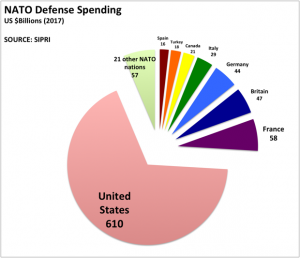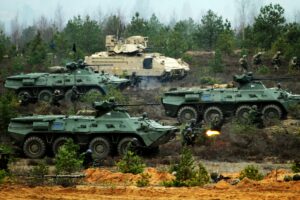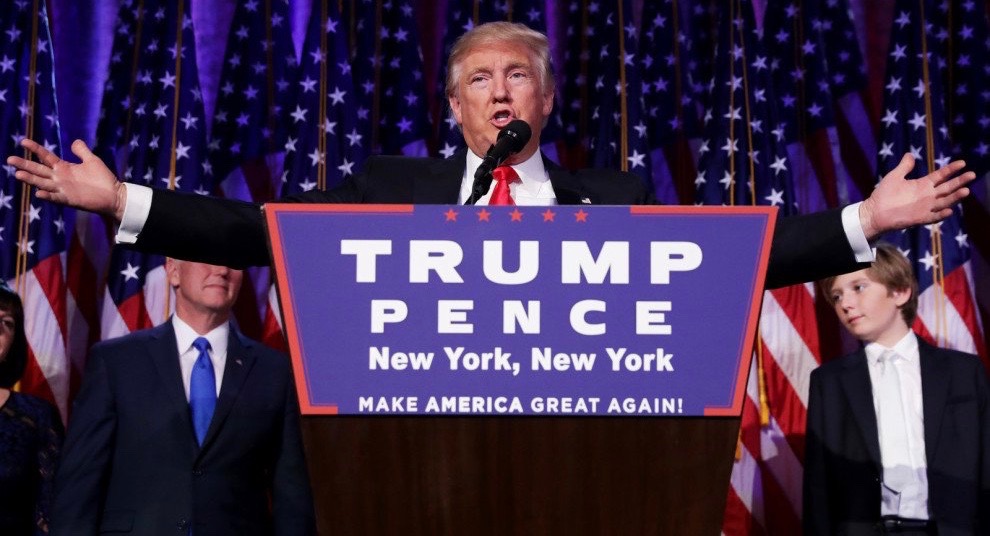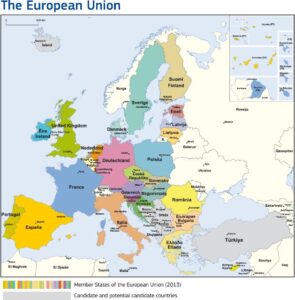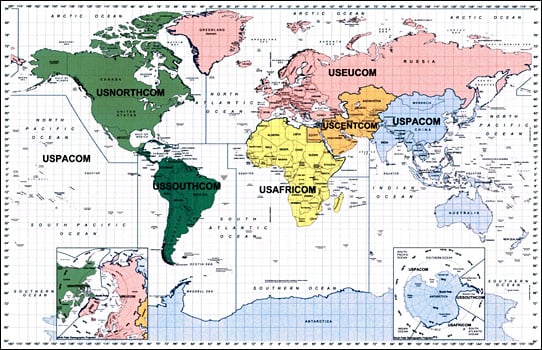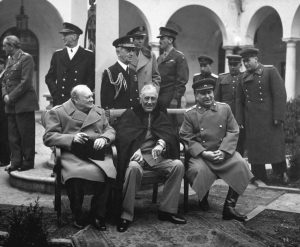Trump’s Wrecking Ball Ideology
Posted on
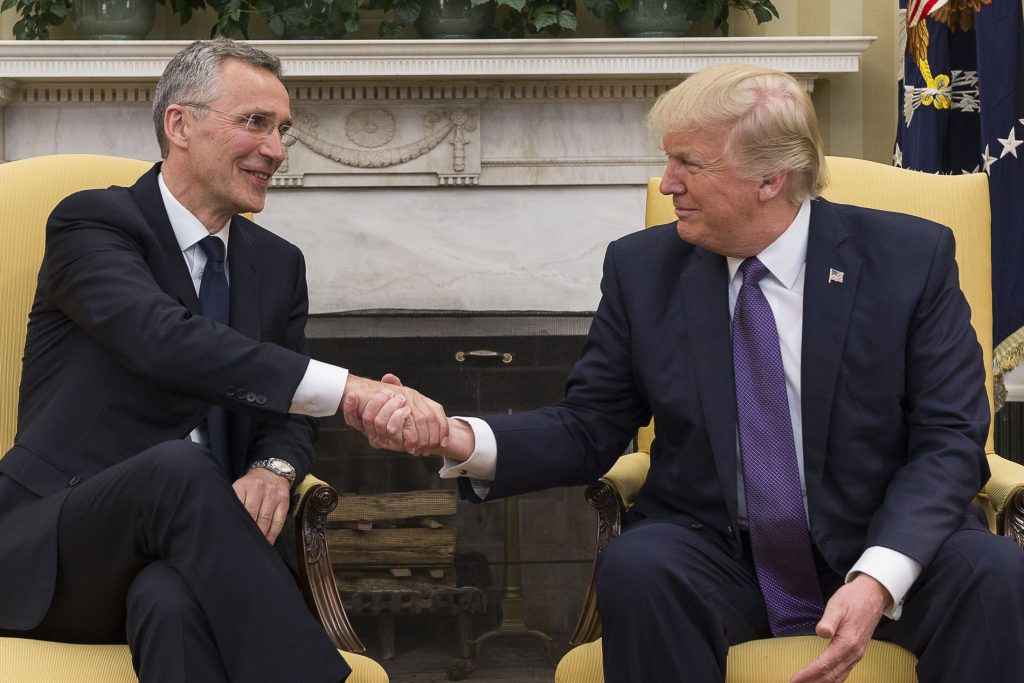
A deceptively friendly exchange between NATO Secretary General Jen Stoltenberg and US President Donald Trump
A year ago, it would have been tempting to write off President Trump’s “bull in a china shop” diplomacy as the product of inexperience and impulsiveness. However, after eighteen months in the White House tenure, Trump is looking like a man with a method, a leader acting according to a consistent ideology — if not a traditional strategy — and even a kind of disruptive genius.
“I think President Trump has an agenda and knows exactly what he is doing,” said William Cohen, a moderate Republican who became Clinton’s secretary of Defense. “He wants to return to an 18th and 19th century ‘balance of power’ global order, because he sees himself as being a strongman in the mold of the autocratic leaders he admires, like (Vladimir) Putin in Russia and Xi Jinping in China,”
“Trump sees all these multilateral organizations like the EU, NATO, and the World Trade Organization as existing simply to restrain strong leaders, and he wants no part of that,” Cohen told me in an interview. “Trump believes the United States should be able to do what he wants it to do, when he wants to do it, without the constraints of multilateral organizations and the rules they represent. That’s his agenda.”
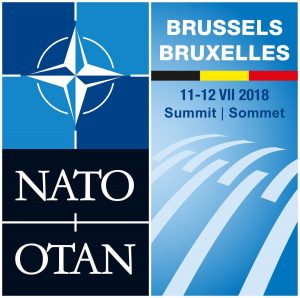 In that light, look at what President Trump is up to just this week. At the NATO summit in Brussels he stunned observers with some of the most pointed public criticisms of ally Germany ever heard in the councils of the Western alliance. Then he forced a last-minute emergency meeting to privately threaten that the United States could go it alone if allies failed to spend more on defense. At the end he held an impromptu press conference to claim a questionable victory and declared himself once again a “stable genius.”
In that light, look at what President Trump is up to just this week. At the NATO summit in Brussels he stunned observers with some of the most pointed public criticisms of ally Germany ever heard in the councils of the Western alliance. Then he forced a last-minute emergency meeting to privately threaten that the United States could go it alone if allies failed to spend more on defense. At the end he held an impromptu press conference to claim a questionable victory and declared himself once again a “stable genius.”
Trump went straight from Brussels to London, where he promptly dropped another protocol shattering bombshell, targeting the already teetering government of his host Prime Minister Theresa May. In a seemingly inexplicable interview with The Sun, Trump imposed himself on the internal politics of America’s closest ally by criticizing May’s “soft Brexit” plan to cut ties with the European Union, and cast doubt on his willingness to strike a new trade deal with her government.
Trump then praised May’s archrival and “hard Brexit” champion Boris Johnson as a potentially excellent prime minister in-waiting. Johnson is another innate disrupter, who this week brought the British government to the verge of collapse by resigning as Foreign Secretary over his pique that Prime Minister May is not making a clean enough break from the European Union.
As Cohen argues, there is a logical explanation why Trump has singled out Germany for such opprobrium, undermined May’s “soft Brexit” plan, and at all times focused his greatest ire on the European Union. After shedding nearly all of the moderating influences from his inner circle and cabinet this year, Trump is now a leader in full of a global movement with a specific ideology and a strategy for remaking the world. And as Trump prepares for his one-on-one summit with Russian President Vladimir Putin, whatever guardians are left of the liberal world order that the U.S. has led for seven decades should be very afraid.
A Crumbling Order
A clue to Trump’s grand strategy was revealed by his welcoming committee in Great Britain, which included the leaders of some of Europe’s prominent rightwing populist movements. They had gathered at a five-star hotel in London’s swank Mayfair district to plot strategy and cheer the arrival of their American champion.
Reportedly in attendance was rightwing French populist Louis Aliot, boyfriend of French anti-immigrant firebrand Marine Le Pen, whom Trump tacitly supported in the last French presidential election. Rightwing British politician and Brexit mastermind Nigel Farage was also present, having personally campaigned with Trump in 2016.
At the center of this gathering of rightwing populists was Trump’s former chief strategist Steve Bannon, who, as POLITICO reported, is in London to rally the populist leaders and act as a “surrogate” for Trump with the British media. Though he was fired from the White House last August after a falling out with Trump over comments to a book author, Bannon remains the most thoughtful and articulate defender of the agenda at the core of Trumpism: “deconstruction of the administrative state” that is responsible for upholding the post-World War II, rules-based international order.
To grasp why Trump’s summitry this week inspired such fear and trepidation in establishment circles, it’s important to understand the degree to which the nationalist populist ideology that Trump and Bannon share with their rightwing populist counterparts in Europe is a threat to fundamental democratic values.
“Trump has consistently embraced an ideology which holds that the rules-based international order that America led for over half a century was great for our allies, but it tilted the economic playing field in a way that was a disaster for us,” said Ivo Daalder, a former U.S. ambassador to NATO, and co-author of the upcoming book The Empty Throne: America’s Abdication of Global Leadership.
“In more recent years,” Dalder continued, “he has added this nativism which holds that the United States and Europe are both under attack from immigrants, and he’s particularly disdainful of politicians who he sees as letting the immigrants in, which explains his constant targeting of [German Prime Minister Angela] Merkel. That aligns Trump with illiberal forces that are already ascendant in Hungary, Poland, Austria, Italy, Turkey and, yes, nationalist Russia under Putin.”
Nicholas Burns, former U.S. Ambassador to NATO and now at Harvard’s Kennedy School of Government, recently returned from an extended trip to Europe to speak with officials there. He believes Trump has opened the most dangerous breach in the transatlantic alliance in its seven decade history.
“We have had sharp disagreements on specific issues in the past, but there has never before been any doubt that both sides were committed to the alliance and to democratic values,” Burns told me in an interview. “What really leapt out to me in my discussions with European officials is their belief that Trump no longer supports a democratic future for Europe, but rather embraces these rightwing, pro-Russian populist movements.”
Trump, Burns said “has thus turned American policy on its head by consistently picking fights with democratic allies like [France’s Emmanuel] Macron, [Germany’s Angela] Merkel and [Canada’s Justin] Trudeau, while cozying up to autocrats like [Chinese President] Xi Jinping, [North Korean leader] Kim Jong Un, and [Russia’s Vladimir] Putin.”
“He also consistently tells the American people that NATO allies are bad, and Putin is okay,” Burns said. “That’s absolutely untrue, and extraordinarily disturbing, if that is Trump’s true mindset.”
There’s no doubt that the nationalist, populist deconstruction agenda of Trump, Bannon and their European allies benefit from working together. Bannon has spent considerable time in recent months advising and championing ascendant rightwing populist parties throughout Europe. The rallying cry for these parties is a nativist rejection of immigrants and an embrace of hyper-nationalism. They view “globalists” as the common enemy and multilateralism as a plot by the “international elite.” If that makes these nationalist populist parties instinctively authoritarian and pro-Russian, skeptical of NATO, and virulently anti-European Union, well, Bannon for one has no problem with that.
Because the global nationalist populist movement began in earnest with Brexit, it’s also logical that its American champion, Trump, would throw the United States’ lopsided weight behind a “hard Brexit” for Great Britain.
“One thing I brought to the Trump campaign was lessons from observing populist nationalist movements in Europe, and Trump ran a nationalist populist campaign,” Bannon said in a recent interview with Euro News television. “We launched ‘Breitbart London’ particularly to observe this nationalist populism as practiced by [Brexit architect] Nigel Farage, who was a more professional version of the [American] Tea Party.”
On the European side of the Atlantic, nationalist populism achieved a ground-shaking victory this spring in Italy. There, the right-wing, anti-immigrant League Party joined forces with the leftwing populists of the Five-Star Movement, with the two anti-establishment groups now governing Italy in an unlikely coalition.
But the triumph of the movement finds its purest expression in Hungarian leader Victor Orban, who famously declared “the new state that we are constructing in Hungary is an illiberal state, a non-liberal state.” Orban has launched an assault on the independent judiciary in Hungary and built a wall on his southern border to keep immigrants out.
“I think Victor Orban is a hero to the nationalist populist movement worldwide, and what he has done is nothing short of heroic,” said Bannon. “And I think of President Trump along the same lines. Orban got his wall, and eventually Trump will too.”
Manchurian Candidate or Wrecking Ball?
Even as he makes waves in Great Britain and prepares to travel to Helsinki for a hastily scheduled summit with Russian President Vladimir Putin, Trump has raised profound questions about his own deconstruction agenda. In the past few months he has taken a wrecking ball both to close allies and the pillars of the international order.
Beginning in May, Trump unilaterally slapped tariffs on imports, provoking a trade war not only with China, but also with allies in North America and the European Union. He also dangled a potential fix to the Iran Nuclear Accord in face-to-face meetings with the leaders of close European allies who were instrumental in negotiating the agreement, only to then humiliate them and tear up the deal regardless. Last month, Trump threw the G-7 summit of the world’s richest democracies into disarray by refusing to sign its communiqué embracing free trade, engaging in ad hominen attacks on its host Canada, and inexplicably suggesting that Russia should be allowed back into the group.
Trump eviscerated the European Union. It is “as bad as NAFTA,” he said at a recent rally, adding “sometimes our worst enemies are our so-called friends.” He continued to single out Germany’s Merkel for special fury over her original sin on immigration, recently criticizing her at a weak moment when her coalition threatened to fracture over immigration and bring her government down. Trump seemed to cheer Merkel’s demise in a tweet that also falsely claimed a spike in German crime:
“The people of Germany are turning against their leadership as migration is rocking the already tenuous Berlin coalition,” Trump tweeted. “Crime in Germany is way up. Big mistake made all over Europe in allowing millions of people in who have so strongly and violently changed their culture!”
This week, Trump sowed profound doubt and distrust in the bedrock Western alliance by publicly pressuring NATO allies to bend to his will, or else he would just have to “do his own thing.” (What that was, he never defined). And through it all, he has expressed almost nothing but praise for Russian strongman Vladimir Putin.
Indeed, Trump could hardly have done better if he were determined to dismantle the pillars of the international order and undermine the foundational alliance of western democracies for the benefit of Vladimir Putin.
In searching for an explanation for Trump’s behavior, former FBI Director James Comey has posited the “Manchurian Candidate” theory – namely, that Putin manipulates Trump through some damning “kompromat,” or compromising dirt. “I think it’s possible. I don’t know. These are more words I never thought I’d utter about a President of the United States, but it’s possible,” Comey told ABC News earlier this year.
After being interviewed by investigators of special counsel Robert Mueller looking into possible Trump campaign collusion with Russian interference in the 2016 election, former Trump campaign adviser Sam Nunberg concluded that Mueller harbored the same suspicions. “He thinks Trump is the Manchurian candidate, and I will tell you I disagree with that,” Nunberg told CNN.
But a more likely explanation for Trump’s action is the influence of his former chief strategist Bannon, and the ideological affinity both men share with the right-wing populist movements now ascendant in Europe. That explanation, in many ways as troubling as any conspiracy theory, holds that an increasingly unshackled Trump, no longer encumbered by the moderating influences of establishment figures in his inner circle, really does share an ultra-nationalist worldview with Putin.
It is a worldview that is openly nativist and deeply antagonistic to the multilateralism, collective security and democratic values of what author Robert Kagan has called “The World that America Made.” In a poignant warning in The Washington Post, Kagan wrote that “the democratic alliance that has been the bedrock of the American-led liberal order is unraveling. At some point, and probably sooner than we expect, the global peace that that alliance and that order undergirded will unravel too…[T]he world crisis is upon us.”
Trump Against Globalism
“If you look closely at Trump’s speeches, he really does believe we should live in a world of hard, self-interested nation states,” said Charles Kupchan, a former senior director for European Affairs on the National Security Council, now at the Council on Foreign Relations. “He has articulated a vision of Western civilization that is white and Christian, and all that really is very simpatico with Vladimir Putin’s worldview.”
That interpretation of Trump’s worldview would explain his open hostility to Europe, especially as it evolved after World War II and is represented by the European Union. “The ‘European Project’ is about taming the nation-state, bringing down borders, and replacing national identities with a pluralist identity,” Kupchan said in an interview. “As a consequence, Trump just seems to have a deep-seated animosity towards traditional Europe.”
As Trump prepares for a one-on-one summit in Helsinki with Russian President Vladimir Putin, with no American aides or record keepers in attendance, some observers are already comparing it to the Yalta Conference of 1945. That’s where the soon-to-be victorious U.S., Soviet and British leaders divided the spoils of war and sketched out their respective “spheres of influence.”
Every word and concession that Trump offers after his summit with Putin meeting will be parsed, and rightly so, for signs of his new world order. Trump has already suggested his willingness for nationalist great powers to reorder the planet when he reportedly mused that Russia’s annexation of Crimea by military force might be permissible because most of its citizens speak Russian.
“I believe Trump sees the world not divided between West and East anymore, but rather between nationalist populists and ‘globalists,’” said Daalder. “That aligns him against internationalist leaders in Great Britain, France, Germany and Canada, and more in tune with anti-immigrant, illiberal and authoritarian regimes in Eastern Europe, Turkey, China and Russia. That plays right into Putin’s hands.”
“If Trump comes away from their summit saying he’s going to relax sanctions on Russia or freeze ‘provocative’ NATO exercises, then that will be as damaging as calling into question America’s commitment to come to the defense of our NATO allies,” Dalder said. “I’m very worried that path leads to the kind of ultra-nationalism and division that characterized Europe in the 1930s — in the run-up to World War II.”
Subscribe to our newsletter
Promotions, new products and sales. Directly to your inbox.


